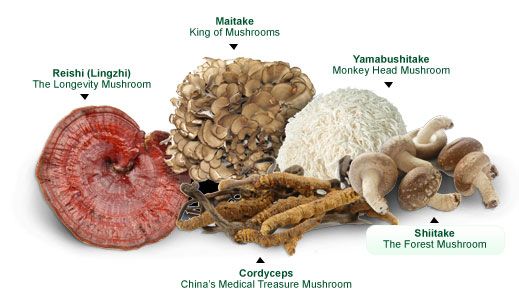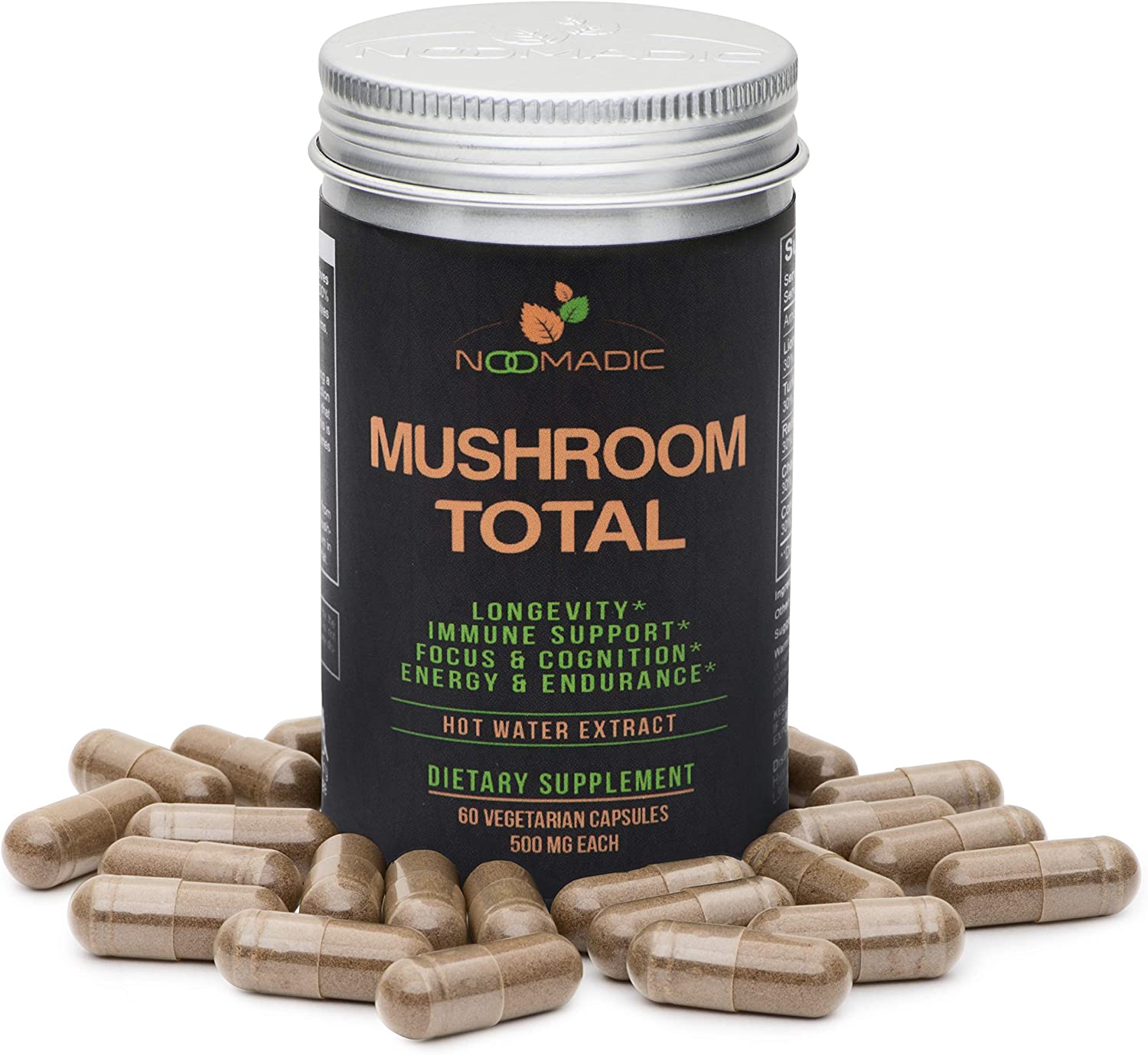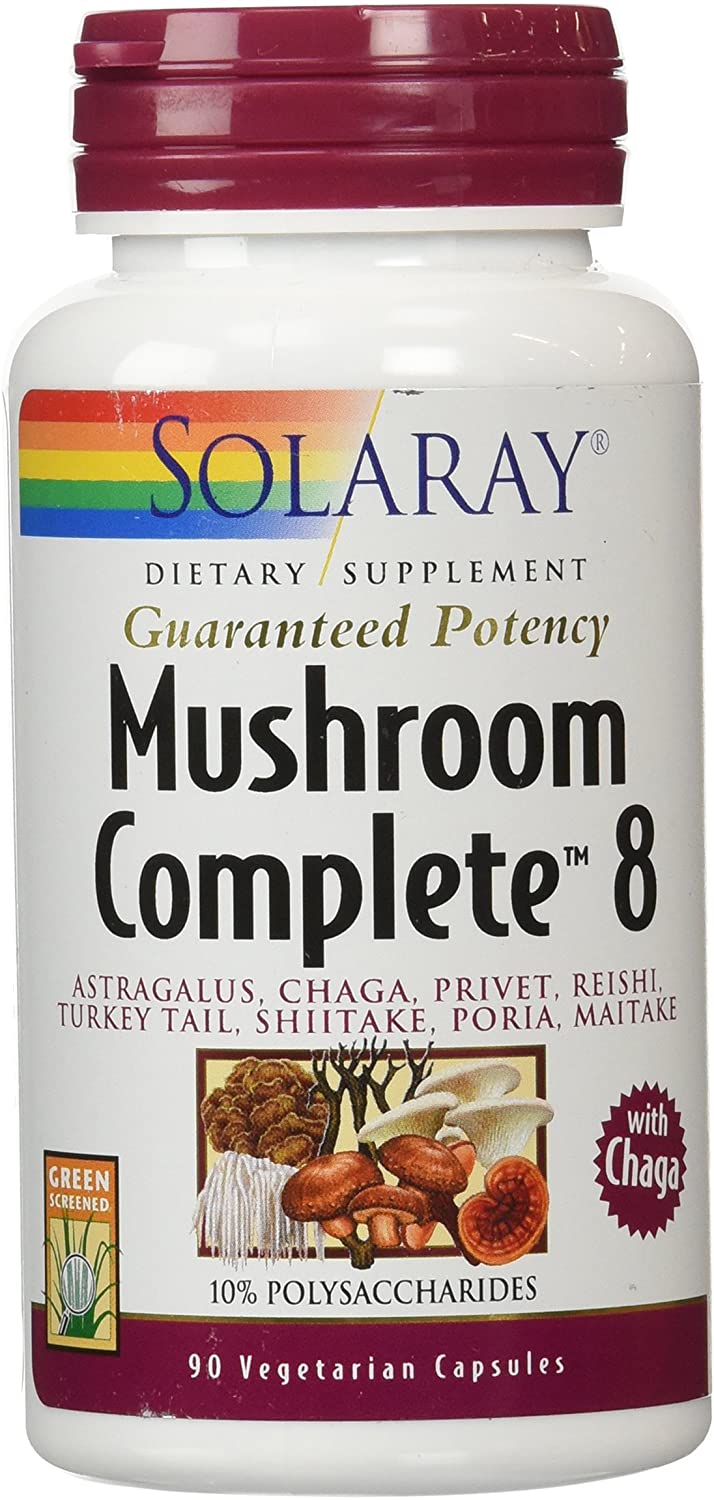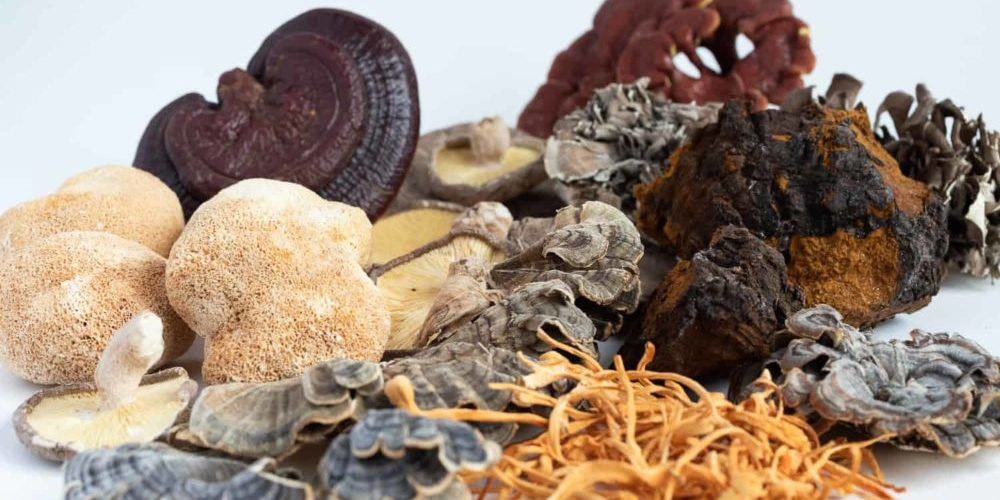A “mushroom complex” is a mix of mushroom extracts used together for medicinal purposes. The idea is that multiple mushroom species can work together to produce a specific result, much as multiple musical notes work together to make a chord. Mushrooms with similar benefits can enhance each other, mushrooms with different benefits can balance out each other’s side effects, and synergistic effects (where different substances interact to create new results) are possible.
Unfortunately, there has been little to no research into the effectiveness of most complexes—what research exists on medicinal mushrooms concerns mushroom species tested separately. The use of complexes (whether custom-blended or commercially prepared) therefore depends on the clinical experience of practitioners.
IMAGE | PRODUCT | Header | ||
|---|---|---|---|---|
OUR #1 RATED 30% Beta-D-Glucans | ||||
10% Polysaccharides | ||||
Mushroom Complex Benefits
There are too many different mushroom complexes to list—the number of possible combinations of potentially medicinal mushroom species is nearly infinite, so it’s difficult to provide users with any kind of guidance as to what to take. The safest bet is always to talk with a qualified practitioner, especially given the possibility of synergy, a situation where two or more substances interact within the body to produce effects different from what either produces alone, a more-than-the-sum-of-their-parts situation.
It’s also worth noting that some of the conditions for which mushroom products are thought to be helpful (for example, diabetes and certain cancers) require the care of a medical doctor, in addition to whatever supportive or alternative therapies a patient wants to try. Mushrooms should never replace medicine, particularly not mushrooms self-prescribed by the patient on the basis of an article on the internet.
That being said, a non-expert can begin to explore the possibilities of medicinal mushrooms by learning which species are thought to have which effects. Someone looking for, say, improved cognition or a strengthened immune system can expect the right complex to include one or more of the species considered individually to confer that benefit.
Immune Support
Substances derived from Turkey Tail are routinely used in both China and Japan to strengthen the immune system as part of cancer treatment—although research on the mechanisms involved is still preliminary[i]. Reishi extracts have been traditionally used to strengthen the immune system, claims supported by at least some research[ii]. In one study, people who ate Shitake mushrooms regularly showed improvement in certain immune markers[iii].
Anti-inflammatory Effects
Chronic inflammation is a factor in a wide variety of health problems. Mushrooms shown to reduce inflammation, at least in experimental animals include Lion’s Mane[iv] and Chaga[v].
Cardiovascular Support
Lion’s Mane extracts lower triglyceride levels and slow the development of obesity in experimental animals[vi][vii]. Cordyceps extracts contain a substance known to protect the heart from certain kinds of damage[viii]. Shitake extract lowers blood pressure and cholesterol levels in experimental hypertensive rats[ix]. The mushroom also lowered the cholesterol of experimental mice on a high-fat diet, and let them develop less fat on their livers[x].
Cancer Treatments
In both animal studies and in vitro studies, lion’s mane extracts slow the growth of certain cancers[xi]. Cordyceps has been effective against certain cancers in mice[xii], as well as against one of the more dangerous side effects of many cancer treatments—immune-system suppression—also in mice[xiii]. Chaga inhibits the growth of certain cancers both in vitro[xiv] and in experimental animals[xv]. Maitake extract has shown promising results in in vitro studies against human breast cancer cells and as a means of strengthening an immune response potentially capable of attacking cancerous growths[xvi]. The same extract also slightly suppressed tumor growth in mice and increased the immune response[xvii].
Diabetes Treatment
Lion’s Mane extracts can lower blood sugar[xviii] and reduce diabetic nerve pain[xix] in experimental animals. Cordyceps fruiting body extract (as opposed to extracts of the corpse of the insect from which the fruiting body grew) reduced the severity of diabetes in experimental rats[xx]. Chaga effectively treated type 2 diabetes in experimental mice[xxi]. Maitake extracts given to experimental diabetic rats can lower blood sugar and increase immune function[xxii].
Support for the Brain and Nervous System
Lion’s Mane contains substances known to stimulate brain growth[xxiii], and the mushroom can protect experimental mice from memory loss[xxiv]. A preliminary human trial showed improvement in patients with mild cognitive impairment[xxv]. In experimental rats, lion’s mane extract improves recovery from both nerve damage[xxvi] and stroke[xxvii].
Support for Physical Stamina and Recovery Time
Cordyceps extracts have improved certain measures of athletic performance in generally healthy older adults[xxviii] but not, interestingly, in trained athletes[xxix]. Turkey tail extracts improved athletic performance in mice[xxx].
References:
[i] Chang, Y., Zhang, M., Jiang, Y., Liu, Y., Luo, H., Hao, C., Zeng, P., Zhang, L. (2017). Preclinical and Clinical Studies of Coriolus versicolor Polysaccharopeptide as an Immunotherapeutic in China. Discovery Medicine 23(127): 207–219.
[ii] Lin, Z. (2005). Cellular and Molecular Mechanisms of Immuno-Modulation by Ganoderma lucidum. Journal of Pharmacological Sciences 99(2): 144-53.
[iii] Dai, X., Stanilka, J. M., Rowe, C. A., Esteves, E. A., Nieves, Jr., C., Spaiser, S. J., Christman, M. C., Langkamp-Henken, B.,Percival, S. S. (2015). Consuming Lentinula edodes (Shitake) Mushrooms Daily Improves Human Immunity: A Randomized Dietary Intervention in Healthy Young Adults. Journal of the American College of Nutrition 34(6):478-87.
[iv] Qin, M., Geng, Y., Lu, Z., Xu, H., Shi, J., Xu, X., Xu, Z. (2016). Anti-inflammatory Effects of Ethanol Extract of Lion’s Mane Medicinal Mushroom, Hericium erinaceus (Agaricomycetes), in Mice with Ulcerative Colitis. International Journal of Medicinal Mushrooms. 18(3): 227–34.
[v] Mishra, S. K., Kang, J., Kim, D., Oh, S. H., Kim, M. K. (2012). Orally Administered Aqueous Extract of Inonotus obliquus ameliorates Acute Inflammation in Dextran Sulfate Sodium (DSS)-Induced Colitis in Mice. Journal of Ethnopharmacology 143(2): 524-32.
[vi] Choi, W., Kim, Y., Park, B., Kim, J. Lee, S. (2013). Hypolipidaemic Effect of Hericium erinaceum Grown in Artemisia capillaris on Obese Rats. Mycobiology 41(2): 94–99.
[vii] Hiwatashi, K., Kosaka, Y., Suzuki, N., Hata, K., Mukaiyama, T., Sakamoto, K., Shirakawa, H., Komai, M. (2010). Yamabushitake Mushroom (Hericium erinaceus) Improved Lipid Metabolism in Mice Fed a High-Fat Diet. Bioscience, Biotechnology, and Biochemistry 74(7): 1447-51.
[viii] Yan, X., Zhang, Z., Yao, H., Guan, Y., Zhu, J., Zhang, L., Jia, Y., Wang, R. (2013). Cardiovascular Protection and Antioxidant Activity of the Extracts from the Mycelia of Cordycepts sinensis Act Partially via Adenosine Receptors. Phytotherapy Research 27(11): 1597-604.
[ix] Kabir, Y., Yamaguchi, M., Kimura, S. (1987). Effect of Shitake (Lentinus edodes) and Maitake (Grifola frondosa) Mushrooms on Blood Pressure and Plasma Lipids of Spontaneously Hypertensive Rats. Journal of Nutritional Science and Vitaminology 33(5): 341-6.
[x] Yang, H., Hwang, I., Kim, S., Jeung, E. (2013). Lentinus edodes Promotes Fat Removal in Hypercholesterolemic Mice. Experimental and Therapeutic Medicine 6(6): 1409-1413.
[xi] Li, G., Yu, K., Li, F., Xu, K., Li, J., He, S., Cao, S., Tan, G. (2014). Anticancer Potential of Hericium erinaceus Extracts Against Human Gastrointestinal Cancers. Journal of Ethnopharmacology 153(2): 521-30.
[xii] Yamaguchi, N., Yoshida, J., Ren, L. J., Chen, H., Miyazawa, Y., Fujii, Y., Huang, Y. X., Takamura, S., Suzuki, S., Koshimura, S., et al. (1990). Augmentation of Various Immune Reactivities of Tumor-bearing Hosts with an Extract of Cordyceps sinensis. Biotherapy 2(3): 199-205.
[xiii] Liu, W., Chuang, W., Tsai, M., Hong, J., McBride, W. H., Chiang, C. (2009). Cordyceps sinensis Health Supplement Enhances Recovery from Taxol-induced Leukopenia. Experimental Biology and Medicine.
[xiv] Lee, S. H., Hwang, H. S., Yun, J. W. (2009). Antitumor Activity of Water Extract of a Mushroom, Inonotus obliquus, Against HT-29 Human Colon Cancer Cells. Phytotherapy Research 23(12): 1784-9.
[xv] Arata, S., Watanabe, J., Maeda, M., Yamamoto, M., Matsuhashi, H., Mochizuki, M., Kagami, N., Honda, K., Inagaki, M.(2016). Continuus Intake of the Chaga Mushroom (Inonotus obliquus) Aqueous Extract Suppresses Cancer Progression and Maintains Body Temperature in Mice. Heliyon 2(5): e00111.
[xvi] Alonso, E. N., Orozco, M., Nieto, A. E., Balogh, G. A. (2013). Genes Related to Suppression of Malignant Phenotype Induced by Maitake D-Fraction in Breast Cancer Cells. Journal of Medicinal Food 16(7).
[xvii] Masuda, Y., Inoue, H., Ohta, H., Miyake, A., Konishi, M., Nanba, H. (2013). Oral Administration of Soluble β-Glucans Extracted from Grifola frondoda Induces Systemic Antitumor Immune Response and Decreases Immunosuppression in Tumor-Bearing Mice. International Journal of Cancer 133(1): 108-19.
[xviii] He, X., Wang, X., Fang, J., Chang, Y., Ning, N., Guo, H., Huang, K., Huang, X., Zhao, Z. (2017), Structures, Biological Activities, and Industrial Applications of the Polysaccharides from Hericium erinaceus (Lion’s Mane) Mushroom: A Review. International Journal of Biological Macromolecules 97: 228-237.
[xix] Yi, Z., Shao-iong, Y., Ai-hong, W., Zhi-chun, S., Ya-fen, Z., Ye-ting, X., Yu-ling, H. (2015). Protective Effect of Ethanol Extracts of Hericium erinaceus on Alloxan-Induced Diabetic Neuropathic Pain in Rats. Evidence-based Complimentary Alternative Medicine 595480.
[xx] Lo, H., Tu, S., Lin, K., Lin, S. (2004). The Anti-hyperglycemic Activity of the Fruiting Body of Cordyceps in Diabetic Rats Induced by Nicotinamide and Streptozotocin. Life Sciences 74(23): 2897-908.
[xxi] Wang, J., Wang, C., Li, S., Li, W., Yuan, G., Pan, Y., Chen, H. (2017). Anti-diabetic Effects of Inonotus obliquus Polysaccharides in Streptozotocin-induced Type 2 Diabetic Mice and Potential Mechanism via PisK-Akt Signal Pathway. Biomedicine & Pharmacotherapy 95: 1669-1677.
[xxii] Chen, Y., Lee, C., Hsu, T., Lo, H. (2015). Submerged-culture Mycelia and Broth of the Maitake Medicinal Mushroom Grifola frondosa (Higher Basidiomycetes) Alleviate Type 2 Diabetes-Induced Alterations in Immunocytic Function. International Journal of Medicinal Mushrooms 17(6): 541-56.
[xxiii] Lai P., Naidu, M., Sabaratnam, Wong, K., David, R. P., Kuppusamy, U. R., Abdullah, N., Malek, S. N. A., (2013). Neurotropic Properties of the Lion’s Mane Medicinal Mushroom, Hericium erinaceus (Higher Basidiomycetes) from Malaysia. International Journal of Medicinal Mushrooms 15(6): 539-54.
[xxiv] Mori, K., Obara, Y., Moriya, T., Inatomi, S., Nakahata, N. (2011). Effects of Hericium erinaceus on Amyloid β(25-35) Peptide-induced Learning and Memory Deficits in Mice. Biomedical Research 32(1): 67-72.
[xxv] Mori, K., Inatomi, S., Ouchi, K., Azumi, Y., Tuchida, T. (2009). Improving Effects of the Mushroom Yamabushitake (Hericium erinaceus) on Mild Cognitive Impairment: A Double-blind Placebo-controlled Clinical Trial. Phytotherapy Research 23(3): 367-72.
[xxvi] Wong, K., Naidu, M., David, P., Abdulla, M. A., Abdullah, N., Kuppusamy, U. R., Sabaratnum, V. (2011). Peripheral Nerve Regeneration Following Crush Injury to Rat Peroneal Nerve by Aqueous Extract of Medicinal Mushroom , Hsieh, M., Lu, C., Lee, Ko., Lee, L., Chen, W., Chen, C., Huang, W., Kuo, H. (2014). Protective Effects of Hericium erinaceus Mycelium and Its Isolated Erinacine A against Ischemia-Injury-Induced Neuronal Cell Death via the Inhibition of iNOS/p38 MAPK and Nitrotyrosine. International Journal of Molecular Sciences 15(9): 15073-89.
[xxviii] Yi, X., Xi-zhen, H., Jia-shi, Z. (2004). Randomized Double-blind Placebo-controlled Clinical Trial and Assessment of Fermentation Product of Cordyceps sinensis (Cs-4) in Enhancing Aerobic Capacity and Respiratory Function of the Healthy Elderly Volunteers. Chinese Journal of Integrative Medicine 10: 187–192.
[xxix] Parcell, A. C., Smith, J. M., Schulthies, S. S., Myrer, J. W., Fellingham, G. (2004). Cordyceps sinensis (CordyMax Cs-4) Supplementation Does Not Improve Endurance Exercise Performance. International Journal of Sport Nutrition and Exercise Metabolism 14(2): 236-42.
[xxx] Ho, C., Tung, Y., Kung, W., Huang, W., Leung, W., Huang, C., Wu, J. (2017). Effect of Coriolus versicolor Mycelia Extract on Exercise Performance and Physical Fatigue in Mice. International Journal of Medical Sciences 14(11): 1110-1117.






